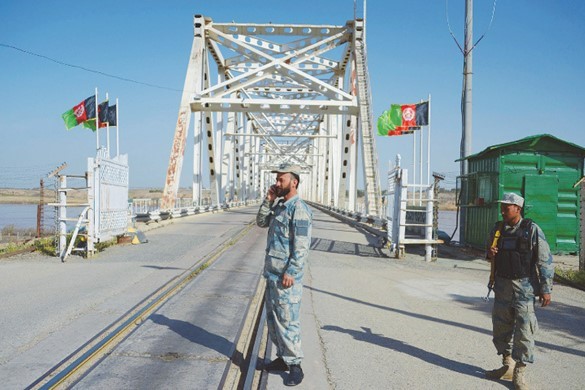This past week, a cooperative railroad agreement between Afghan and Uzbek railway companies broke down, India announced continued financial assistance to Afghanistan, Tajikistan spoke out about the problem of narcotics smuggling radiating from its southern borders, and a new group of Afghan girls have begun their post-primary studies in Kazakh, Kyrgyz, and Uzbek universities as part of a joint EU-Central Asia educational program.

Afghan-Uzbek border crossing at Hairatan, 2016. Image source: AFP
Beginning on February 1st, traffic on the primary railroad connecting Afghanistan and Uzbekistan was suspended (Radio Azatlyk). The Hairatan-Mazar-i-Sharif line links the Uzbek border city of Termez with Afghanistan’s third-largest city, Mazar-i-Sharif. Uzbekistan’s state-owned rail carrier, Uzbekistan Temir Yollari, announced that the temporary closure of the railway was due to the Afghanistan Railway Authority’s failure to implement agreed-upon measures of safety, maintenance, and technical standards. However, representatives of the Afghanistan Railway authority asserted that it was Uzbekistan that violated the previous agreement, claiming that Uzbekistan attempted to acquire employment for more than four times the number of people indicated in the contract (UPL 24). The Afghan Railway Authority, owned and operated by the Taliban government, signed an agreement with Uzbekistan Temir Yollari in December 2022, the purpose of which was to develop the quality of the line, in the hope of slowly expanding rail traffic between the two countries. This suspension comes amid a recent freeze in Afghan-Uzbek relations. Due to the late January onslaught of extreme weather in Central Asia, Uzbekistan briefly halted the flow of electricity to Afghanistan. Taliban authorities reacted with frustration, claiming that this represented a breach of contract. On February 5th, it was reported that Uzbekistan Temir Yollari and the Afghanistan Railway Authority were in the midst of talks to sign a new contract and reopen the railroad in the coming days (Gazeta.uz).
The Finance Minister of India, Nirmala Sitharaman, revealed this week that India’s national budget will continue to provide for financial assistance for Afghanistan, to the tune of nearly $24.5 million in 2023 (Eurasia Daily). This corresponds with the amount given in 2022. Despite the fact that India does not formally recognize the Taliban as the legitimate government, lawmakers in New Delhi continue to prioritize dialogue and ties with Afghanistan. India has supported many Afghan infrastructure projects in the past, including the aptly named Afghan-India Friendship Dam in the Herat Province.
Tajikistan’s narcotics enforcement agency announced this week that drug smuggling from Afghanistan has notably increased in recent months (Vecherniy Bishkek). Khabibullo Vohidzoda, the director of the agency, the number of Afghan smugglers detained on the Afghan-Tajik border, although itself small, has ticked up markedly since the seizure of power by the Taliban in 2021 – from 8 in that year to 19 in 2022. Despite assurances by the Taliban government that it would crack down on drug production, the United Nations Office on Drugs and Crime has reported that the cultivation of opium increased by 32% in 2022, the first full year of Taliban rule (Foreign Policy).
Amidst the continued ban on women’s higher education in Afghanistan, more than 100 Afghan girls have already or will soon begin their studies in Central Asia through a program supported by the European Union and implemented by Kazakhstan, Kyrgyzstan, and Uzbekistan (Radio Free Europe). The program was founded in 2019, two years before the collapse of the Islamic Republic of Afghanistan. In recent months, Central Asian governments have reiterated their dedication to its continuation. Approximately 50 girls have received full scholarships to study in Kazakh universities and are projected to graduate in 2027.
Still, the situation is fraught and complicated for many Afghan students. Speaking to RFE/RL Barna Kargar, who graduated from the Almaty University of Power Engineering and Telecommunications in 2021, shared that she was denied asylum by the Kazakh government, but cannot return to Afghanistan due to fear of persecution by the Taliban government and lack of opportunity. The status and future prospects of Afghan students in Central Asia after graduation remain uncertain.

